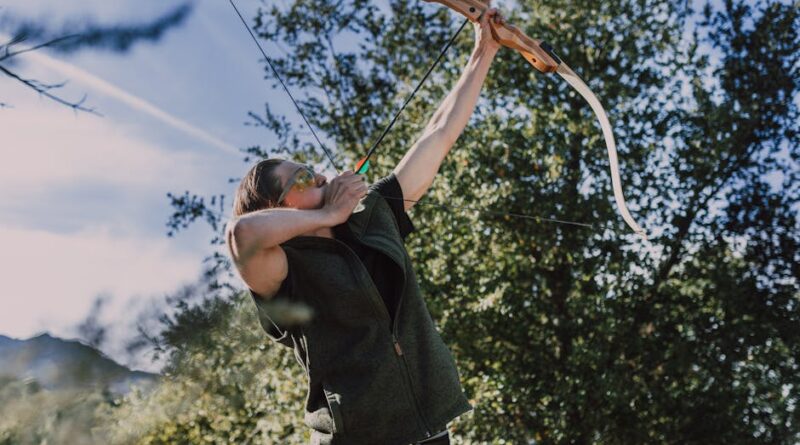Promoting Green and Sustainable Hunting: A Comprehensive Guide
When we think of hunting, images of rifles, camouflaged gear, and trophies may come to mind. However, there is a crucial movement within the hunting community that seeks to promote sustainability, conservation, and ethical practices in hunting. This movement, known as green and sustainable hunting, is gaining traction worldwide as individuals and organizations recognize the importance of preserving our natural resources while enjoying the age-old tradition of hunting.
But what exactly is green and sustainable hunting? How does it differ from traditional hunting practices? And how can hunters and conservationists work together to ensure that our wildlife populations thrive for generations to come? In this comprehensive guide, we will delve into the world of green and sustainable hunting, exploring its principles, benefits, challenges, and future prospects.
The Principles of Green and Sustainable Hunting
Green and sustainable hunting is rooted in the idea that hunters have a responsibility to act as stewards of the land and wildlife they pursue. This means not only following hunting regulations and ethical guidelines but also actively contributing to the conservation and restoration of habitats and species.
One of the key principles of green and sustainable hunting is the concept of fair chase. This involves hunting in a manner that gives wildlife a fair chance to escape, ensuring that the pursuit is ethical and respectful. Additionally, green hunters prioritize the utilization of harvested game for food and other resources, minimizing waste and maximizing the benefits of the hunt.
Another essential principle of green and sustainable hunting is the conservation of wildlife populations. This involves engaging in practices that support healthy ecosystems, including habitat restoration, population management, and wildlife monitoring. By actively participating in conservation efforts, hunters can help maintain biodiversity and prevent species decline.
Overall, green and sustainable hunting is about striking a balance between the enjoyment of hunting and the responsibility to protect our natural resources. It requires a deep understanding of ecosystems, wildlife behavior, and ethical hunting practices, as well as a commitment to ongoing education and collaboration with conservationists and fellow hunters.
The Benefits of Green and Sustainable Hunting
Green and sustainable hunting offers a wide range of benefits, both for hunters and the environment. By promoting ethical practices and conservation efforts, green hunters can help preserve biodiversity, maintain healthy wildlife populations, and protect natural habitats. This, in turn, ensures that future generations will have the opportunity to experience the thrill of hunting and the beauty of the natural world.
One of the key benefits of green and sustainable hunting is the positive impact on wildlife populations. By participating in conservation programs, habitat restoration projects, and population management efforts, hunters can help ensure that game species thrive and that non-game species are protected. This contributes to overall ecosystem health and resilience, benefiting not only wildlife but also the communities that depend on healthy ecosystems for their livelihoods.
In addition to conservation benefits, green and sustainable hunting also offers economic advantages. Hunting generates revenue for local communities through the sale of licenses, permits, and equipment, as well as through tourism and related activities. By practicing sustainable hunting, hunters can help support local economies and promote the long-term viability of hunting as a recreational activity.
Furthermore, green and sustainable hunting can foster a deeper connection to nature and a greater appreciation for the natural world. By immersing themselves in the outdoors, observing wildlife behavior, and participating in conservation efforts, hunters can develop a profound respect for the environment and a sense of stewardship for the land and wildlife around them.
Challenges and Controversies in Green and Sustainable Hunting

While green and sustainable hunting offers numerous benefits, it is not without its challenges and controversies. One of the main challenges facing green hunters is the need to balance conservation goals with recreational interests. As hunting populations grow and wildlife habitats shrink, conflicts can arise between conservationists and hunters over the best way to manage wildlife populations and protect natural resources.
Another challenge in green and sustainable hunting is the enforcement of ethical guidelines and hunting regulations. While many hunters adhere to fair chase principles and conservation practices, there are individuals who engage in unethical or illegal hunting activities, such as poaching or trophy hunting. These actions not only harm wildlife populations but also undermine the efforts of green hunters to promote ethical and sustainable hunting practices.
Additionally, green and sustainable hunting faces criticism from some animal rights activists and environmentalists who believe that hunting is inherently unethical and harmful to wildlife. While these concerns are valid, proponents of green hunting argue that when conducted responsibly and ethically, hunting can be a valuable tool for conservation and ecosystem management.
Overall, navigating the challenges and controversies of green and sustainable hunting requires open dialogue, collaboration, and a commitment to finding common ground among stakeholders. By working together, hunters, conservationists, and policymakers can develop solutions that promote the long-term sustainability of hunting and the protection of our natural resources.
Case Studies in Green and Sustainable Hunting

One of the most compelling aspects of green and sustainable hunting is the real-world impact it can have on wildlife populations and ecosystems. Several case studies illustrate the success of green hunting practices in promoting conservation, sustainability, and ethical hunting standards.
Case Study 1: Conservation Hunting in Africa
Conservation hunting, also known as trophy hunting, has been a controversial topic in Africa due to concerns about the impact on wildlife populations and the ethics of hunting for sport. However, some conservation organizations argue that well-regulated trophy hunting can contribute to conservation efforts by generating revenue for wildlife management, supporting local communities, and incentivizing the protection of endangered species.
One example of successful conservation hunting is the communal conservancy program in Namibia. Through this program, local communities are given the rights to manage wildlife on their land and benefit from the revenue generated by hunting safaris. By providing economic incentives for conservation, the program has helped increase wildlife populations, reduce poaching, and improve community livelihoods.
While conservation hunting remains a contentious issue, the case of Namibia demonstrates that when properly regulated and managed, hunting can play a positive role in wildlife conservation and community development.
Case Study 2: Adaptive Management in North America
In North America, adaptive management approaches are being used to promote sustainable hunting practices and wildlife conservation. Adaptive management involves monitoring and adjusting hunting regulations based on scientific data and feedback from stakeholders to ensure that wildlife populations remain healthy and stable.
One example of adaptive management in action is the management of waterfowl populations in the United States. By monitoring waterfowl populations, habitat conditions, and hunting harvests, wildlife managers can adjust hunting seasons, bag limits, and habitat management practices to maintain sustainable waterfowl populations and hunting opportunities.
Through adaptive management, hunters, conservationists, and policymakers can work together to address the complex challenges of wildlife management and hunting sustainability, ensuring that hunting remains a viable and valuable conservation tool for future generations.
Expert Opinions on Green and Sustainable Hunting
Experts in the fields of wildlife conservation, hunting ethics, and environmental science offer valuable insights into the principles and practices of green and sustainable hunting. Their perspectives can provide guidance and inspiration for hunters and conservationists seeking to promote ethical and sustainable hunting practices.
Dr. Jane Goodall, Primatologist and Conservationist
Dr. Jane Goodall, renowned primatologist and conservationist, has emphasized the importance of ethical hunting practices and wildlife conservation in maintaining healthy ecosystems and protecting biodiversity. She advocates for a holistic approach to wildlife management that incorporates ethical considerations, conservation goals, and community engagement to ensure the long-term sustainability of hunting and wildlife populations.
According to Dr. Goodall, “Hunting can be a valuable tool for conservation when conducted responsibly and ethically. By following fair chase principles, supporting habitat conservation, and engaging in conservation programs, hunters can make a positive contribution to wildlife conservation and the protection of our natural resources.”
Common Misconceptions About Green and Sustainable Hunting
Despite the growing popularity of green and sustainable hunting, there are still misconceptions and misunderstandings surrounding this practice. Addressing these misconceptions can help foster a more informed and constructive dialogue about the role of hunting in conservation and sustainability.
Misconception 1: Green Hunting is Incompatible with Conservation
One common misconception about green hunting is that it is incompatible with conservation goals. Some people believe that hunting is inherently harmful to wildlife populations and ecosystems, and that promoting green hunting practices will not mitigate these negative impacts. However, proponents of green hunting argue that when conducted responsibly and ethically, hunting can support conservation efforts by contributing to habitat restoration, wildlife management, and community development.
Misconception 2: Green Hunting is Only About Trophies
Another misconception about green hunting is that it is primarily focused on trophy hunting and the pursuit of big game animals. While trophy hunting is a part of the hunting tradition, green hunters prioritize ethical practices, fair chase principles, and the sustainable use of harvested game for food and other resources. By emphasizing the importance of ethical hunting practices and conservation goals, green hunters seek to promote a more holistic and responsible approach to hunting.
Conclusion
In conclusion, green and sustainable hunting represents a vital movement within the hunting community that seeks to promote ethical practices, conservation efforts, and responsible stewardship of our natural resources. By embracing the principles of fair chase, wildlife conservation, and habitat preservation, hunters can contribute to the long-term sustainability of hunting and the protection of our wildlife populations.
As we look to the future, it is essential that hunters, conservationists, and policymakers continue to work together to address the challenges and controversies surrounding green and sustainable hunting. By fostering open dialogue, collaboration, and a shared commitment to conservation, we can ensure that hunting remains a valued and valuable tradition that benefits both people and wildlife.
Ultimately, green and sustainable hunting is not just about pursuing game or achieving trophiesit is about respecting the land, valuing the wildlife, and preserving the natural world for future generations. By promoting ethical hunting practices, conservation efforts, and community engagement, we can create a future where hunting and conservation go hand in hand, ensuring that our wildlife populations thrive and our natural habitats remain intact for years to come.




